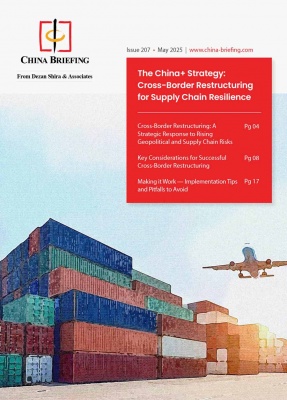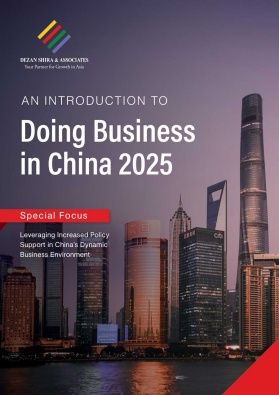US Investment Ban on China: What it Means Now That it’s in Effect
The US has introduced a stringent investment ban on China, effective January 2025. These restrictions focus on sensitive technologies like AI, semiconductors, and quantum computing and require detailed due diligence. These regulations will significantly impact US investors and Chinese firms, especially in the affected sectors, reshaping US-China economic relations.
The United States has escalated its efforts to regulate outbound investments in China, focusing on advanced technologies deemed critical to national security. This initiative reflects a broader strategy to curtail the flow of US capital and expertise into sectors that could bolster China’s military capabilities or surveillance infrastructure.
In 2024, the Biden Administration formalized a regulatory framework targeting investments in artificial intelligence (AI), semiconductors, and quantum computing. These measures, effective January 2025, introduce prohibitions on certain transactions—such as those linked to quantum computing—and require mandatory notifications for others involving high-performance AI systems and advanced microelectronics.
The new regime places significant due diligence responsibilities on US investors, marking a turning point in economic statecraft where investment flows are increasingly scrutinized through a national security lens. While the measures have garnered bipartisan support in Washington, they have also sparked tensions with the Chinese government, which has condemned the policies as protectionist and warned of potential disruptions to global supply chains.
This article delves into the evolution of the US investment ban on China, analyzing the implications for businesses and their ripple effects on US-China economic relations and beyond. It also considers the growing integration of economic and security strategies in shaping foreign investment policies.
Background and development of the US outbound investment regime
The Biden Administration’s outbound investment regime represents a culmination of growing bipartisan concerns in Washington about China’s technological advancements in areas deemed critical to national security. Over the past decade, US policymakers have increasingly scrutinized outbound capital flows to Chinese firms in sectors like artificial AI, semiconductors, and quantum computing, which are considered dual-use technologies with both civilian and military applications. The goal is to restrict the transfer of financial resources and expertise that could enable China’s technological and military ambitions.
The formal development of this policy framework began in August 2023, when the Biden Administration issued an Advance Notice of Proposed Rulemaking (ANPR). Released alongside an executive order, the ANPR sought public input on a potential outbound investment review framework. This initial stage sparked a robust debate, with industry leaders, think tanks, and policymakers offering diverse perspectives on the proposal’s scope and implications. While some stakeholders called for tighter restrictions to safeguard national security, others emphasized the need for greater clarity to prevent unintended disruptions to global investment and trade flows.
Building on this feedback, the administration issued a Notice of Proposed Rulemaking (NPR) in July 2024, providing additional details and seeking further public comment. This phase of consultation allowed for a deeper examination of the proposed restrictions, particularly their potential economic impact and practical enforcement challenges. The administration aimed to strike a balance between addressing national security concerns and minimizing adverse effects on legitimate business activities.
The final rule, unveiled in late 2024 and effective as of January 2, 2025, reflects the refinements made during this extended rulemaking process. Key changes include clearer definitions of “covered activities,” the introduction of specific thresholds for restricted investments (e.g., computing power thresholds for AI systems), and detailed guidelines on due diligence expectations for US investors. By incorporating input from multiple stakeholders, the final policy seeks to establish a framework that is both robust in addressing security risks and pragmatic in accommodating the complexities of global economic interdependence.
Overview of the finalized outbound investment regime
The finalized outbound investment regime, introduced by the Biden Administration, establishes a framework to regulate US investments in specific sectors of the Chinese economy, targeting technologies deemed critical to US national security. As observed, the policy builds on an executive order and a series of public consultations, culminating in a detailed rule set issued in October 2024.
How does the regime work?
The new regulations apply to US persons and foreign entities controlled by US persons, covering investments in Chinese entities or entities outside of China controlled by Chinese persons that engage in covered activities within the targeted sectors. The rule introduces a two-tiered system:
- Prohibited transactions: Investments in quantum computing and specific high-risk activities in AI and semiconductors are banned outright.
- Notifiable transactions: Certain transactions in AI and semiconductors that pose a lower risk profile must be disclosed to the U.S. Treasury Department before proceeding.
Notifications may be reported to Congress and, in some cases, disclosed publicly if deemed in the national interest. This framework reflects the administration’s effort to enhance transparency and oversight while addressing national security concerns.
What types of transactions are covered in the regime?
The rules capture a wide range of investment activities, including:
- Acquisition of equity interests or contingent equity interests;
- Debt financing that provides governance or financial control;
- Greenfield and brownfield investments;
- Joint ventures and partnerships; and
- Limited partner investments in funds that direct capital towards covered activities.
The rules specifically address intangible benefits associated with US investments, such as managerial expertise, talent networks, and enhanced market standing, which could inadvertently support China’s strategic objectives.
What are the exemptions and exceptions in place?
The finalized policy seeks to minimize disruption to routine investment activities by providing several exceptions:
- Publicly traded securities, including stocks and bonds, are exempt if the investment does not confer control over the target entity.
- Limited partner investments are exempt if the total capital commitment does not exceed US$2 million or if binding assurances are in place to prevent the funds from being directed toward covered activities.
- Transactions involving white-listed countries—to be designated by the Treasury Secretary—are exempt. These countries must demonstrate effective outbound investment controls aligned with US national security objectives.
Due diligence requirements under the outbound investment regime
A central feature of the finalized outbound investment regime is the “knowledge” standard, which establishes the level of due diligence U.S. investors must undertake when evaluating transactions that fall within the scope of the policy. Under this standard, the US Treasury Department will assess whether an investor “knew or should have known” at the time of the transaction that the investment involved a Chinese entity engaged in covered activities related to sensitive technologies. This evaluation is based not only on what the investor knew but also on what they could have reasonably known through diligent inquiry at the time of the investment.
Key considerations in the due diligence process
The Treasury will assess the investor’s due diligence efforts by examining a range of factors that highlight the thoroughness of their inquiry into the potential risks of the transaction. The final rule outlines seven illustrative considerations that will guide the assessment:
- Inquiries made: The Treasury will review what specific questions the investor asked about the investment target and other relevant parties involved in the transaction. This includes evaluating how detailed and targeted the inquiries were to uncover whether the investment aligns with covered activities.
- Contractual representations: The Treasury will also examine the contractual assurances sought by the US investor, including any representations or warranties about the target’s involvement with covered sectors, such as AI, semiconductors, or quantum computing. These safeguards are meant to ensure the investment target is not engaged in activities that pose national security risks.
- Efforts to obtain non-public information: Investors are expected to make reasonable efforts to acquire non-public data related to the target’s relationship with sensitive technologies or activities. The Treasury will assess whether the investor undertook reasonable steps to gather this information, such as seeking reports or accessing confidential sources that could shed light on the target’s operations.
- Review of public information: The Treasury will examine the extent to which the investor considered publicly available information, including official filings, media reports, and other disclosures. This includes determining whether any conflicting or inconsistent information was available and whether it was appropriately considered during the due diligence process.
- Purposeful avoidance of information: The investor’s actions will also be scrutinized to determine whether they actively avoided or failed to seek relevant information. If the investor knowingly disregarded potential red flags or chose not to inquire about certain risks, this may suggest insufficient due diligence.
- Warning signs: The Treasury will look for any warning signs that could indicate the investment target’s potential connection to covered activities. These might include evasiveness or lack of cooperation from the investment target in response to questions, or indications that the target was hiding its involvement in sensitive technologies.
- Use of public and commercial databases: The investor’s use of publicly accessible databases and commercial resources to verify information about the investment target and relevant counterparties will be another key factor. This is important as it shows whether the investor leveraged all available tools to conduct a comprehensive risk assessment.
Expected implications of the new outbound investment regime
The finalization of the Outbound Investment Security Program by the US Department of Treasury introduces several implications for both US investors and Chinese companies.
For US investors, the new regime introduces a more structured framework for identifying and navigating investments into Chinese companies involved in sensitive sectors. Notably, the regulations offer greater clarity on exempted transactions, such as intra-company investments and employee equity options, as well as limited liability for limited partners in pooled investment vehicles. While some flexibility has been introduced, especially in the area of due diligence, the core requirements for compliance remain stringent. US investors will be required to undertake thorough due diligence to ensure they are not inadvertently engaging in prohibited or notifiable transactions. The Treasury Department will assess each case individually, and investors will need to be vigilant about the specific activities of the companies they invest in.
Moreover, the rules aim to avoid a blanket investment ban, which was a concern among the US business community. The absence of case-by-case reviews, as seen with the CFIUS, means that a more systematic approach will be taken to assess transactions. This could allow for more predictable investment activity, although the knowledge standard for due diligence introduces a level of uncertainty, as investors will be held accountable based on what they should have known at the time of the investment.
On the other hand, the new restrictions will likely have a substantial impact on Chinese companies within the affected sectors. For these businesses, particularly those in AI, semiconductors, and quantum computing, raising capital or securing investment from US investors will become more challenging. Companies in these sectors will face heightened scrutiny and due diligence requirements from potential US investors, which could delay or even prevent some deals from moving forward. The rules also limit the opportunities for Chinese firms seeking US public listings or financing, further isolating these companies from crucial global capital markets.
However, Chinese companies that do not operate in these sensitive sectors may not face outright restrictions but will still be subject to intensified scrutiny. Investors from the US will be required to confirm compliance with the regulations, especially in light of increased geopolitical tensions. This could result in a chilling effect on US investments in China, even outside the restricted sectors, as political considerations complicate economic decisions. Risk aversion could lead to a broader hesitation to engage with Chinese companies, regardless of the sector, contributing to a less favorable investment environment.
Moreover, the broader implication of the new regime will likely be the increased separation of US and Chinese business interests, particularly in the technology space. Even Chinese companies not directly affected by the restrictions may find that their operations are indirectly impacted by the shifting investment climate. US companies will likely be cautious in making new investments, and those with existing investments may find it more difficult to expand their shareholdings in Chinese firms.
All in all, in the coming months, US investors will need to familiarize themselves with the intricacies of the final rules and prepare for a more rigorous compliance environment. With civil and criminal penalties for non-compliance, businesses will need to prioritize robust due diligence processes and potentially seek legal guidance to ensure their investments are within the boundaries of the new regime.
About Us
China Briefing is one of five regional Asia Briefing publications, supported by Dezan Shira & Associates. For a complimentary subscription to China Briefing’s content products, please click here.
Dezan Shira & Associates assists foreign investors into China and has done so since 1992 through offices in Beijing, Tianjin, Dalian, Qingdao, Shanghai, Hangzhou, Ningbo, Suzhou, Guangzhou, Haikou, Zhongshan, Shenzhen, and Hong Kong. We also have offices in Vietnam, Indonesia, Singapore, United States, Germany, Italy, India, and Dubai (UAE) and partner firms assisting foreign investors in The Philippines, Malaysia, Thailand, Bangladesh, and Australia. For assistance in China, please contact the firm at china@dezshira.com or visit our website at www.dezshira.com.
- Previous Article NGO Accounting and Compliance in China: Key Highlights
- Next Article Preparing for Chinese New Year 2025: Essential Tips for Businesses

























